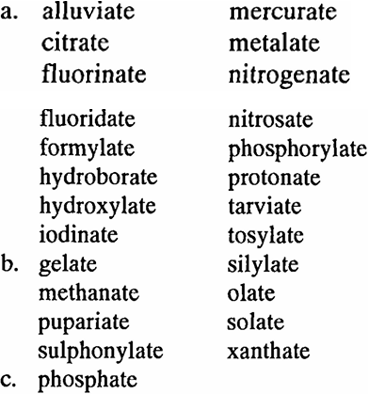


 Grammar
Grammar
 Tenses
Tenses
 Present
Present
 Past
Past
 Future
Future
 Parts Of Speech
Parts Of Speech
 Nouns
Nouns
 Verbs
Verbs
 Adverbs
Adverbs
 Adjectives
Adjectives
 Pronouns
Pronouns
 Pre Position
Pre Position
 Preposition by function
Preposition by function 
 Preposition by construction
Preposition by construction
 Conjunctions
Conjunctions
 Interjections
Interjections
 Grammar Rules
Grammar Rules
 Linguistics
Linguistics
 Semantics
Semantics
 Pragmatics
Pragmatics
 Reading Comprehension
Reading Comprehension|
Read More
Date: 2023-12-19
Date: 2023-10-30
Date: 2023-10-05
|
Ornative/resultative -ate
In spite of the apparently wide range of meanings of -ate verbs I will argue that the meaning of the suffix -ate is in fact more restricted than the meaning of -ize. In particular, productive -ate expresses (only) an ornative-resultative meaning. We will shortly see that the majority of other forms are not derived through the suffixation of -ate but through other morphological processes, namely back-formation, conversion, local analogy, clipping, etc. We will first discuss ornative-resultative -ate before we turn to the other processes.
I suggest the following LCS for verbs with the derivational suffix -ate:
(1) 
In contrast to -ize, the LCS of -ate given in (1) is much more constrained. According to (1), -ate is productively suffixed only to bases that denote chemical substances. The derivatives denote either the physical transfer of such a substance to the entity denoted by NPTheme, or, in its resultative interpretation, the inducing of the property denoted by the base in NPTheme· Of the 25 verbs in our corpus that exemplify the given LCS, 16 are ornatives (see (2a)), eight instantiate the resultative meaning (see (2b), and one is attested with both meanings (see (2c)):
(12) 
Even in this most homogeneous class of -ate verbs there are a number of peculiar forms, whose derivational history and phonology is deviant. The regular prosodic pattern of -ate verbs is characterized by alternating stress and a minimum of three syllables, with secondary stress on -ate. Five forms are different in this respect (citrate, phosphate, gelate, olate and solate), of which citrate, phosphate and xanthate exhibit a stress clash, whereas gelate, olate and solate even carry primary stress on -ate. For a detailed discussion of the phonological properties of -ate derivatives.
Although based on a new set of data, our ornative-resultative analysis of -ate is similar to Marchand's observation that -ate can be "freely used to derive verbs from Latin nominal stems, with the meaning 'combine, impregnate, treat with –' " (1969:258). The differences in formalization aside, our approach has two advantages. Firstly, we can also account for the attested resultative meanings, and secondly the denominal character of -ate need not be stipulated, but follows from the LCS itself.
We may now turn to the discussion of the other forms in our corpus, which I argue to be the result of a number of different morphological processes that do not involve the suffix -ate in the way described so far. As we will see, most of these processes are based on local analogies with other already existing complex words.
|
|
|
|
لخفض ضغط الدم.. دراسة تحدد "تمارين مهمة"
|
|
|
|
|
|
|
طال انتظارها.. ميزة جديدة من "واتساب" تعزز الخصوصية
|
|
|
|
|
|
|
جامعة تكريت: نحرص على المشاركة في حفل تخرج طلبة الجامعات الذي يهدف إلى لمّ شمل المجتمع العراقي
|
|
|